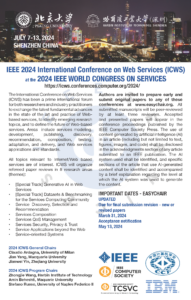IEEE SERVICES 2024 is a hybrid event, with remote participation available. The SRG Workshop call for papers is an open submission call. Please note that the double-blind policy does not apply to symposium/workshop submissions. To submit, please select the SRG workshop track after logging in to EasyChair.
Important Dates (Updated)
Due for new submissions of papers: May 25, 2024
Acceptance notification: June 2, 2024
Camera ready due: June 10, 2024
Workshop Chairs
Jianwei Yin, Zhejiang University (Lead)
Claudio Ardagna, Università degli Studi di Milano
Anca Sailer, IBM Research
Program Chairs
Nicola Bena, University of Milan
Li Kuang, Central South University
Yuji Watanabe, IBM Research, Tokyo
Tiancheng Zhao, Binjiang Institute of Zhejiang University
Publicity Chairs
Xiaolin Zheng, Zhejiang University
Kathrin Brecker, Karlsruhe Institute of Technology
Program Committee
Antongiacomo Polimeno, Università degli Studi di Milano
Chaochao Chen, Zhejiang University
Genoveva Vargas-Solar, CNRS
Honghao Gao, Shanghai University
Hussain Walayat, Australian Catholic University
Javier Alfonso Espinosa-Oviedo, University of Lyon
Jingwu Fan, Hundsun Technologies Incorporation
Junwei Liang, The Hong Kong University of Science and Technology
Kim Jung-Yoon, Gachon University
Liang Chen, Sun Yat-sen University
Lingyan Zhang, Central South University
Mingshuai Chen, Zhejiang University
Mohamed Essaid Khanouche, CNRS
Sarra Abidi, Manouba University
Wenbing Zhao, Cleveland State University
Xingjian Lu, East China Normal University
Yuesheng Xu, Xidian University
Yuyu Yin, Hangzhou Dianzi University
Zhifang Liao, Central South University
Zhiyuan Tan, Napier University
Xiao Xue, Tianjin University
Lizhen Cui, Shandong University
Xiao Sun, Tsinghua University
ICWS Workshop on Services Regulation & Governance (SRG)
The digital economy has become an important engine driving economic growth and a significant breakthrough in industrial upgrading. In the digital economy, digital services, supported by information technologies, such as the Internet, the Internet of Things, and big data, form an efficient connection between service suppliers and service consumers in various sectors of modern service industry. It has changed the traditional supply-demand model, cooperative division of labors, as well as the way of value creation and distribution, and has grown into a new economic model.
While supporting economic growth, digital services should also undertake social responsibilities. Over the past few years, the rapid growth of digital services and various platforms has led to a series of problems caused by regulatory gaps, including internet financial fraud, counterfeit and shoddy products in e-commerce, data misuse and infringement of user privacy, dissemination of illegal content, unfairness and potential discrimination caused by AI algorithms and so on. Effective governance of digital services is urgently needed. Research on the regulation and governance of digital services should be conducted, to form a stable, orderly, and vibrant governance system for digital services and cultivate a healthy governance ecosystem. Therefore, this workshop aims to investigate the research related to the intelligent regulation and governance of digital services.
This workshop aims to investigate research related to intelligent regulation and governance of digital services addressing the aforementioned bleak situation, to form a stable, orderly, and vibrant governance system for digital services and cultivate a healthy governance ecosystem.
Topics and scope:
- Domain specific language model for services regulation rules
- Machine learning for automated services regulation rule understanding
- Foundation models for service regulation understanding and generation
- Domain adaption for service compliance monitoring models
- Evaluation of service compliance monitoring models
- Reasoning and formal language for service regulation
- Automated services compliance monitoring and enforcement
- The quality integration and lifecycle management of regulatory data
- Privacy protection of regulatory data
- Application of AI and LLM in risk management and fraud detection services
- Prediction and estimation in services regulation
- Regulation and governance of Block-chain services
- Compliance as code and policy as code models for compliance digitization and continuous compliance
- Governance and compliance administration topologies
- Evaluation of Cloud security posture management models for compliance
- Big data optimization models for audit
- Trust management and assurance techniques for service regulation






